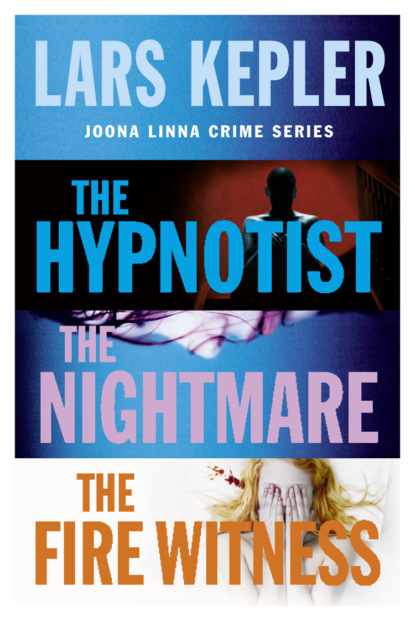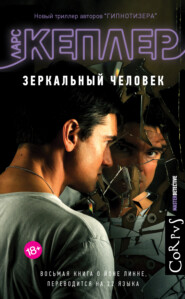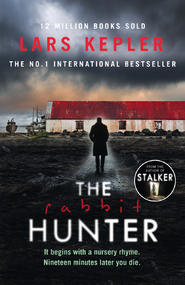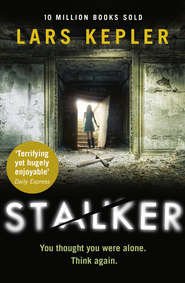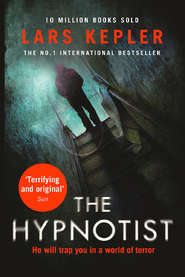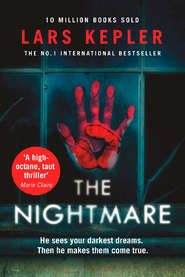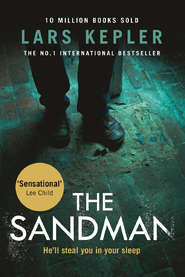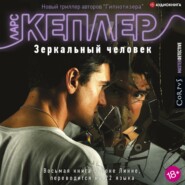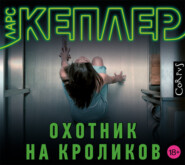По всем вопросам обращайтесь на: info@litportal.ru
(©) 2003-2025.
✖
Joona Linna Crime Series Books 1-3: The Hypnotist, The Nightmare, The Fire Witness
Настройки чтения
Размер шрифта
Высота строк
Поля
“In August.”
“Yes.”
“You’ve been living in a little cottage in Värmdö for four months. Why?”
Once again her gaze flutters away, moving behind Joona’s head. “So I could have peace and quiet to study,” she says.
“For four months?”
She shifts in the chair, crossing her legs and scratching her forehead. “I need to be left in peace,” she says with a sigh.
“Has somebody been bothering you?”
“No.”
“When you say that you want to be left in peace, it sounds as if someone’s been bothering you.”
She gives a faint, joyless smile. “I just like the forest.”
“What are you studying?”
“Political science.”
“And you’re supporting yourself on a student loan?”
“Yes.”
“Where do you buy food?”
“I bike to Saltarö.”
“Isn’t that a long way?”
Evelyn shrugs her shoulders. “I suppose so.”
“Have you seen anyone you know there?”
“No.”
He contemplates Evelyn’s smooth young forehead. “You haven’t seen Josef there?”
“No.”
“Evelyn, listen to me,” says Joona, in a new, more serious tone. “Your brother told us that he was the one who murdered your father, your mother, and your little sister.”
Evelyn stares at the table. Her eyelids tremble; a faint flush rises on her pale face.
“He’s only fifteen years old,” Joona goes on.
He looks at her thin hands and the shining, brushed hair lying over her frail shoulders.
“Why do you think he’s saying he murdered his family?”
“What?” she asks, looking up.
“It seems as if you think he’s telling the truth,” he says.
“It does?”
“You didn’t look surprised when I said he’d confessed,” says Joona. “Were you surprised?”
“Yes.”
She sits motionless on the chair. A thin furrow of anxiety has appeared between her eyebrows. She looks very tired, and her lips are moving slightly, as if she is praying or whispering to herself. “Is he locked up?” she asks suddenly.
“Who?”
She doesn’t look up at him when she replies but speaks tonelessly down at the table. “Josef. Have you locked him up?”
“Are you afraid of him?”
“No.”
“I thought perhaps you were carrying the gun because you were afraid of him.”
“I hunt,” she replies, meeting his gaze.
There’s something peculiar about her, something he doesn’t yet understand. It’s not the usual things: guilt, rage, or hatred. It’s more like something reminiscent of an enormous resistance. He can’t get a fix on it. A defence mechanism or a protective barrier unlike anything he has yet encountered.
“Hare?” he asks.
“Yes.”
“Is it good, hare?”
“Not particularly.”
“What does it taste like?”
“Sweet.”
Joona thinks about her standing in the cold air outside the cottage. He tries to visualise the chain of events.
Erik Maria Bark had taken her gun. He was holding it over his arm and it was broken open, the brass of the cartridges visible. Evelyn was squinting at him in the sunlight. Tall and slim, with her sandy brown hair in a high, tight ponytail. A silvery padded vest and low-cut jeans, damp running shoes. Pine trees behind her, moss on the ground, low-growing lingonberry and trampled toadstools.
Suddenly Joona discovers a crack in Evelyn’s story. He has already nudged at the thought, but it slipped away. Now the crack is absolutely clear. When he spoke to Evelyn in her aunt’s cottage, she sat completely still on the corduroy couch with her hands clamped between her thighs. On the floor at her feet lay a photograph in a frame that looked like a toadstool. Evelyn’s little sister was in the picture, sitting between her parents with the sun glinting off her big glasses.
The little girl must have been four, perhaps even five years old in the picture. In other words, the photograph can be no more than a year or two old. Evelyn claimed that Josef hadn’t been to the cottage for years, but he accurately described the photo and the frame under hypnosis.





